THE RAW TRUTH --
DOGS AND CATS ARE CARNIVORES
In recent years many veterinarians and companion animal guardians have come to realize that despite all our medical advances we are losing the battle of health and wellness for our pets.
We believe that one of the primary reasons for this continual decline in our pet’s health is because our dogs and cats are grossly under-nourished, and struggling to digest and assimilate foods they were not designed to eat.
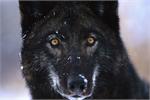 Our devoted, tail wagging family member is nearly genetically identical to a wolf. In fact, research indicates there is less then a 0.2% difference in the DNA of the grey wolf and your furry canine loved one. The biological difference between a dog and a wolf is so minimal that dogs are classified under the same species as the wolf - the “canis lupus” species. Dogs, like wolves, are carnivorous meat-eaters.
Our devoted, tail wagging family member is nearly genetically identical to a wolf. In fact, research indicates there is less then a 0.2% difference in the DNA of the grey wolf and your furry canine loved one. The biological difference between a dog and a wolf is so minimal that dogs are classified under the same species as the wolf - the “canis lupus” species. Dogs, like wolves, are carnivorous meat-eaters.
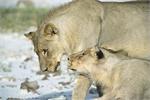
The cat is 100% carnivore. In the wild, their canine and feline counterparts eat prey: raw meat, fat, organs, tendons, and bone. They instinctively know what is nutritionally best for them.
Unfortunately, most pets don’t have the opportunity to use their innate intelligence. They must eat what is put out for them.
Dr. Tom Lonsdale, a 1972 graduate of Royal Veterinary College in London, and one of the early pioneers of the raw feeding concept said “Domestic dogs and cats are carnivores. Feeding them the appropriate carnivore diet represents the single most important contribution to their welfare. The result of feeding dogs [and cats] a highly processed, grain based food is a suppressed immune system and the under-production of the enzymes necessary to thoroughly digest raw meaty bones.”raw meaty bones, (2001) [added]
Carnivores were created and designed to eat raw animal protein. Look at your dog and cat’s anatomy - they have strong jaws for holding, sharp long incisors and jagged sharp molars for ripping, tearing, and
 grinding. They also have very short digestive tracts, and highly acidic gastric juices. Meat, organs, and fat are the proper energy sources for them. Raw meat provides the perfect nourishment they need to support their vital organs, and immune system. It supplies them with all the essential amino acids and living enzymes they need for overall health, strength and power. Without raw meat the carnivore is starved of the vital nutrients necessary to maintain health. Dogs and cats cannot make the amino acids and active living enzymes important to digestion and nutrient assimilation without raw meat in their diets. Insufficient nutrient uptake causes a breakdown in our pet’s immune system, opening them up to an array of health issues and unnecessary suffering.
grinding. They also have very short digestive tracts, and highly acidic gastric juices. Meat, organs, and fat are the proper energy sources for them. Raw meat provides the perfect nourishment they need to support their vital organs, and immune system. It supplies them with all the essential amino acids and living enzymes they need for overall health, strength and power. Without raw meat the carnivore is starved of the vital nutrients necessary to maintain health. Dogs and cats cannot make the amino acids and active living enzymes important to digestion and nutrient assimilation without raw meat in their diets. Insufficient nutrient uptake causes a breakdown in our pet’s immune system, opening them up to an array of health issues and unnecessary suffering.
The National Research Council (NRC), who sets the standards for nutritional-needs in dogs, states that dogs need the 10 essential amino acids that they cannot make on their own. All of these nutritionally required amino acids can be found in animal protein. Dogs and cats are not designed to digest carbohydrates like grains, vegetables, and starches. Unlike humans, they do not have the needed enzyme amylase in their saliva or a long intestinal track. Their small intestine moves food quickly and they are not capable of dealing with foods that require a fermentation process to break down carbohydrates. Their inability to fully digest carbohydrates robs them of essential nutrients and is known to cause digestive upset and over burden of the pancreas. Grains and carbohydrates contain starches that bog down your pet’s digestive process and can inhibit the absorption of essential minerals. Dogs and cats do not need these types of carbohydrates in their diets. They metabolize fat and protein into energy. According to The Waltham Book of Companion Animal Nutrition (1988): “There is no known minimal dietary requirement for carbohydrates…”
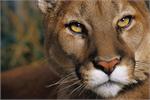 A wild canine or feline (an obliged carnivore) has little to no interest in vegetation.
A wild canine or feline (an obliged carnivore) has little to no interest in vegetation.
Wildlife agencies list the bobcat’s eating habits for example, as strictly carnivorous - bobcats prey upon rabbits, rodents, birds, and deer. They will also eat livestock (e.g., lamb, poultry, and pig).
Experts agree wolves only eat the stomach contents of their prey when the prey is small and it gets consumed as a result of eating the entire animal (like a rabbit for example). L. David Mech, is considered the world’s top wolf biologist. In his book, Wolves: Behavior,
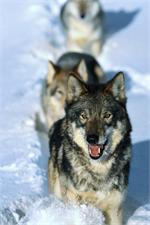 Ecology, and Conservation (2003) he and other contributing experts compiled over 300 years of research and observations of the wild canine. An excerpt from this informative work clearly portrays the natural, instinctive eating behavior of the carnivore. “Wolves usually tear into the body cavity of large prey… and consume the larger internal organs, such as lungs, heart, and liver. The larger rumen [one of the main stomach chambers] is usually punctured during removal and its contents spilled. The vegetation in the intestinal tract is of no interest to the wolves, but the stomach lining and intestinal wall are consumed, and their contents further strewn about the kill site.” [description added]
Ecology, and Conservation (2003) he and other contributing experts compiled over 300 years of research and observations of the wild canine. An excerpt from this informative work clearly portrays the natural, instinctive eating behavior of the carnivore. “Wolves usually tear into the body cavity of large prey… and consume the larger internal organs, such as lungs, heart, and liver. The larger rumen [one of the main stomach chambers] is usually punctured during removal and its contents spilled. The vegetation in the intestinal tract is of no interest to the wolves, but the stomach lining and intestinal wall are consumed, and their contents further strewn about the kill site.” [description added]
The Kerwood Wildlife Education center (Hunting and Meals pages) describes the eating habits of the wolf as: “The wolf’s diet consists mostly of muscle meat and fatty tissue from various animals. Heart, lung, liver, and other internal organs are eaten. Bones are crushed to get to the marrow, and bone fragments are eaten as well." The only part consistently ignored is the stomach and its contents. Although some vegetable matter is taken separately, particularly berries, Canis Lupis doesn’t seem to digest them very well.”
Regardless of what the “creative-tactics” labeling or advertisements say, most commercial pet foods contain up to 60% grain (as well as other questionable ingredients). Wheat, barley, oats, potatoes, corn, soy, etc. are NOT appropriate food sources for our four legged children. A carnivore is incapable of fully digesting or utilizing grains for nourishment.
Just imagine feeding an herbivore - (a horse, rabbit, or cow) a raw meat diet - it would be a health disaster! Dogs and cats may survive on foods devoid of nutritional value, but they will not lead a long healthy life. They will not thrive! It is a known fact that Nutrition is the Foundation of Health in every species.
Generation after generation of this biologically inappropriate feeding practice has caused chronic “dis-ease” in our pets. Most are born of parents that were malnourished and come into this world with weakened immune systems. The deterioration cycle continues with each inappropriate food or treat we feed them. Improper diet is one of the primary factors as to why we are losing the battle of health for our pets. The dramatic increase in chronic, debilitating and fatal illnesses that are plaguing our beloved pets clearly indicates they are undernourished.
Dr Karen Becker, a devoted veterinarian and preventive speaker sums it up - “Dogs, cats, and snakes [ferrets too] are carnivores, with sharp interlocking teeth designed to grasp prey”… “Dogs and cats are not designed to eat or digest grains. So, as you would expect, when you feed your dog and cat companions foods they were not designed to eat, you’re asking for trouble.” healthypets.mercola.com (Your Pet's Good Health Begins in Their Gut (2009))[added]
References:
DNA Studies Trace Fido’s Family Tree, by Sarah Graham (2002) http://www.scientificamerican.com/article.cfm?id=dna-study-traces-fidos-fa
Dog-Wolf breeding history and genetic diversity http://www.nwcreation.net/dogsandwolves.html
The Merck Manual of Veterinary Medicine states:
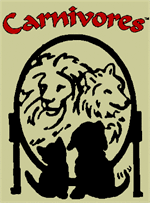
“Domestic dogs and cats are both members of the order of CARNIVORA.Observations of feral canids indicate that their feeding habits are broad and include various parts of plants as well as both small and large prey. By comparison, cats show no omnivorous feeding behaviors and require nutrients that are produced exclusively by other animals, not plants (e.g., vitamin A, arachidonic acid, and Taurine)...”
Click Here to Print this Report
Dogs and Cats are Carnivores
Disclaimer: By utilizing this website you express your consent to our Disclaimer. Unless otherwise noted, the contents of our website and marketing materials are based upon the research and opinions of Grateful Pet, our business partners and reference materials. We are not licensed veterinarians, physicians, or nutritionists. The information is not intended to diagnose or prescribe or to replace a relationship with a qualified health care professional and it is not intended as medical or nutritional advice. It is intended as a sharing of knowledge and information from the research and experience of the Grateful Pet team. We encourage you to make your own health care decisions for your pet based upon your own research and your personal knowledge concerning your pet. If you use the information on this website to make decisions for your pet’s health or your own health, Grateful Pet assumes no responsibility for such decisions. We provide insight, high quality food, supplements, and gentle remedies and recommend seeking advice from a qualified, nutritionally oriented health care provider who has thoroughly researched your pet’s health.